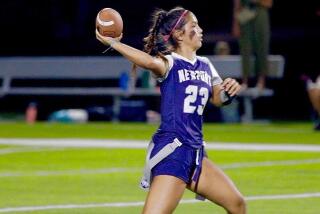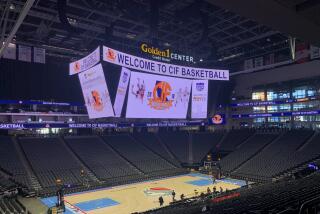College Notebook : NCAA’s Academic Rules Affect Community Colleges
The debate over the NCAA’s Proposition 48 continues, and San Diego-area community colleges have noticed the impact of the rule that requires academically deficient athletes to prove themselves in the classroom before they are allowed on the playing field.
Prop. 48 has had an impact on Division I football recruiting among area community colleges. By this time of the year, at least a dozen community college players have usually committed to NCAA Division I schools. But so far, only five athletes have done so.
“(Prop. 48) has really changed the recruiting process,” said Bill Kinney, assistant football coach and assistant athletic director at Southwestern College. “The whole process is in transition.”
The transition may become lengthier if Prop. 42, recently passed by a vote of 163-154 at the NCAA Convention, goes into effect beginning with the 1990-91 season. Under the rule, athletes who only partially meet the NCAA entrance criteria would not be allowed to receive athletic scholarships for their first year of college. (Under Prop. 48, they might receive athletic scholarships but not practice or play with a team as freshmen.)
Some have said Prop. 42 could result in schools giving financial aid to athletes based on need, leaving less scholarship money for students with fine academic records. But Kinney and many community college coaches also are preparing themselves for higher-caliber athletes to enter their programs.
“We should now get all the Prop. 48 kids,” Kinney said. “I think I saw (a better caliber of players) this year. Our freshmen kids had better talent this year.”
“I think you’ll see a lot of out-of-state players heading for California community colleges,” said Tom Craft, Palomar football coach. California has more than 100, far more than any other state.
The talent pool may be increasing, but Kinney said victims of Prop. 48 who decide to go the community college route are finding it tougher to get recruited by Division I schools.
Prop. 48 students must complete an Associate in Arts degree at a community college before transferring to a 4-year college. Kinney said the requirement makes colleges reluctant to commit to someone early in the recruiting process.
It takes 2 years to earn an AA degree, and most students will not officially be notified if they have fulfilled the requirements until late in the spring semester. Many colleges learned their lesson last season when they waited, only to discover the athlete did not meet his AA.
“That’s happened to a lot of schools,” Kinney said. “They wait, and the kid doesn’t get his AA, and there isn’t a whole lot left to recruit.”
Kinney said that colleges are now willing to take the athlete who had the grades in high school but went to a community college to develop his skills, although that athlete may not be quite as good as a Prop. 48 athlete.
“By the recruiting this year, the colleges are saying to me ‘we’re not going to go heavy on these kids, we’ll see what we can get now,’ ” Kinney said. “A few schools got burned last year waiting for a Prop. 48 kid.”
Five community college players have committed to NCAA Division I schools, four from Grossmont College and one from Palomar.
Grossmont wide receiver Jim Exum (Helix High School) and offensive lineman Kid Cantrell and defensive back Chris Comick (Hoover) have committed to Cal State Long Beach. Outside linebacker Keith Embray (Mt. Miguel) has committed to Nevada Las Vegas. Palomar’s Brian Lasho (Carlsbad), an all-state offensive tackle, is headed for Fresno State.
Several county players figure to be recruited by Division I schools, but many are waiting for their degrees.
Southwestern College has defensive back Kevin Morris (Chula Vista), Montana or Cal Poly San Luis Obispo; strong safety Melvin McFarland (Monte Vista), San Jose State, Indiana State and Montana; nose guard Chuck Hickey, Cal State Long Beach and New Mexico State and wide receiver Richard Sanchez (Sweetwater), Idaho State, Montana and San Jose State.
Possible recruits from San Diego City College include wide receiver Reggie Webb (Morse), running back Kevin Key (Lincoln) and linebacker Greg Hollins (Lincoln).
Palomar College quarterback Duffy Daugherty (Fallbrook) is looking at Idaho State and Pennsylvania; linebacker Shawn Forristall has Nevada Las Vegas and Cal State Fullerton interested, and wide receiver Mike Jones was getting a look from Cal State Fullerton, Utah and Washington.
The San Diego State women’s sports program is appearing often in national polls. The Aztec women’s golf team is ranked No. 12 in Division I by the NCAA. The Aztec women’s tennis team is No. 20 in the Intercollegiate Tennis Coaches Assn. poll.
The Aztec women’s basketball team (14-0 and 5-0 in the Big West) is ranked No. 12 in the nation and one of only three undefeated NCAA Division I teams. Top-ranked Auburn (15-0) and unranked LaSalle (14-0) are the other two unbeaten teams.
The Aztecs will get their toughest test of the season when they travel to play at 10th-ranked Cal State Long Beach (10-4) in a Big West game Thursday. The Aztecs then travel to play No. 19 Nevada Las Vegas (14-1) on Saturday.
More to Read
Go beyond the scoreboard
Get the latest on L.A.'s teams in the daily Sports Report newsletter.
You may occasionally receive promotional content from the Los Angeles Times.










